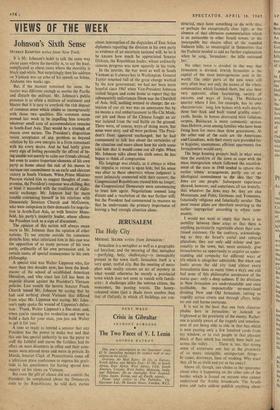VIEWS OF THE WEEK
Johnson's Sixth Sense
MURRAY KEMPTON writes from New York: It is Mr. Johnson's habit to talk the same way about cases where the morality is, to say the least, complicated as about cases where the morality is black-and-white. Not surprisingly then his address on yietnam was an echo of his speech on Selma, Alabama two weeks ago.
But, if the manner remained the same, the matter was different enough to soothe the Pacific and disturb the militant. Mr. Johnson's public presence is so often a mixture of sentiment and bluster that it is easy to overlook the rich deposit of common sense which abides so incongruously with those two qualities. His common sense seemed last week to be impelling him towards whatever small area of accommodation remains in South-East Asia. That would be a triumph of reason over nature. The President's disposition resists acceptance of any problem as beyond solution by his own energies in a form consonant with his every desire. And he had lately given every sign of feeling personally the affront of be- ing unable not merely to calm our friends abroad, but even to assure important elements of his own party at home about the risk of his moves to increase our commitment to an early and clearcut victory in South Vietnam. When Prime Minister Pearson visited him to suggest thoughts of com- promise, the President's response was chilling. But at least it accorded with the traditions of diplo- matic exchange; Mr. Johnson had far more trouble containing himself in his relations with Democratic Senators Church and McGovern, who were outspoken in their demands for negotia- tion in South-East Asia, or with Senator Mans- field, his party's majority leader, whose silence the President took as a sign of discontent.
The opinion of this nation will always mean more to Mr. Johnson than the opinion of other nations. To see anyone outside the consensus disturbs him; what infuriated him in this case was the opposition of so many persons of his own party, ordinarily of his own persuasion and, in certain cases, of special consequence to his own philosophy.
A special trial was Walter Lippman who, for more than two decades now, has been the head- master of the school of established American liberalism, and who since last fall has been in majestic dissent against the President's Vietnam policies. Last month the heretic Senator Frank Church teased Mr. Johnson by saying that he had said nothing about Vietnam that differed from what Mr. Lippman was saying. Mr. John- son's reply spoke the wound of Lippman's defec- tion: 'Frank, Walter Lippman's a fine man; and, when you're running for re-election and want to build a dam for your state, you just ask Walter to get it for you.'
A tone so ready to remind a senator that any President has the power to make war and that this one has special authority to use the purse to stuff the faithful and starve the faithless had its effect on most dissenters in office and their com- ments were uttered more and more in private. In March, Senator Clark of Pennsylvania came off a television press conference to express his grati- tude to his questioners for having spared him inquiry on his views on Vietnam.
But even the gift of silence did not content the President; he complained about the Democrats even to the Republicans; he told dark stories about interception of the dispatches of East Asian diplomats reporting the division in his own party as evidence of an uncertain national will; he let it be known how much he appreciated Senator Dirksen, the Republican leader, whose ordinarily sinuous progress was now squarely in his train.
In the interim, the war went as well in South Vietnam as it always has in Washington. General Taylor returned full of the great change worked by the new government; we had not been more hopeful since 1961 when Vice-President Johnson visited Saigon and came home to report that the subsequently unfortunate Diem was the Churchill of Asia. Still, nothing seemed to change; the ex- tension of our air war was an annoyance but by no means a real embarrassment to Ho Chi Minh; our jets and those of the Chinese fought an air war isolated from the real battle on the ground. There were, of course, ways of doing more, but none were easy, and all were perilous. The Presi- dent's front appeared unchanged; but he had commenced to talk less about the certainties of the situation and more about how his sixth sense told him that it would come out all right. When Mr. Johnson talks about his sixth sense, he has begun to think of compromise.
His language was cloudy, as it always is when the impulse to retreat is upon him; but his sense was clear to those observers whose judgment is most intimately connected with their careers; the Congressional Republicans trusted him no longer; the Congressional Democrats were commencing to trust him again. Negotiations seemed long distant and a resolution of the war farther still; but the President had commenced to reassure us that he understands the primary importance of leaving a bad enough situation alone.






























 Previous page
Previous page